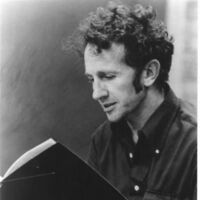A Story
Everyone loves a story. Let’s begin with a house.
We can fill it with careful rooms and fill the rooms
with things—tables, chairs, cupboards, drawers
closed to hide tiny beds where children once slept
or big drawers that yawn open to reveal
precisely folded garments washed half to death,
unsoiled, stale, and waiting to be worn out.
There must be a kitchen, and the kitchen
must have a stove, perhaps a big iron one
with a fat black pipe that vanishes into the ceiling
to reach the sky and exhale its smells and collusions.
This was the center of whatever family life
was here, this and the sink gone yellow
around the drain where the water, dirty or pure,
ran off with no explanation, somehow like the point
of this, the story we promised and may yet deliver.
Make no mistake, a family was here. You see
the path worn into the linoleum where the wood,
gray and certainly pine, shows through.
Father stood there in the middle of his life
to call to the heavens he imagined above the roof
must surely be listening. When no one answered
you can see where his heel came down again
and again, even though he’d been taught
never to demand. Not that life was especially cruel;
they had well water they pumped at first,
a stove that gave heat, a mother who stood
at the sink at all hours and gazed longingly
to where the woods once held the voices
of small bears—themselves a family—and the songs
of birds long fled once the deep woods surrendered
one tree at a time after the workmen arrived
with jugs of hot coffee. The worn spot on the sill
is where Mother rested her head when no one saw,
those two stained ridges were handholds
she relied on; they never let her down.
Where is she now? You think you have a right
to know everything? The children tiny enough
to inhabit cupboards, large enough to have rooms
of their own and to abandon them, the father
with his right hand raised against the sky?
If those questions are too personal, then tell us,
where are the woods? They had to have been
because the continent was clothed in trees.
We all read that in school and knew it to be true.
Yet all we see are houses, rows and rows
of houses as far as sight, and where sight vanishes
into nothing, into the new world no one has seen,
there has to be more than dust, wind-borne particles
of burning earth, the earth we lost, and nothing else.

